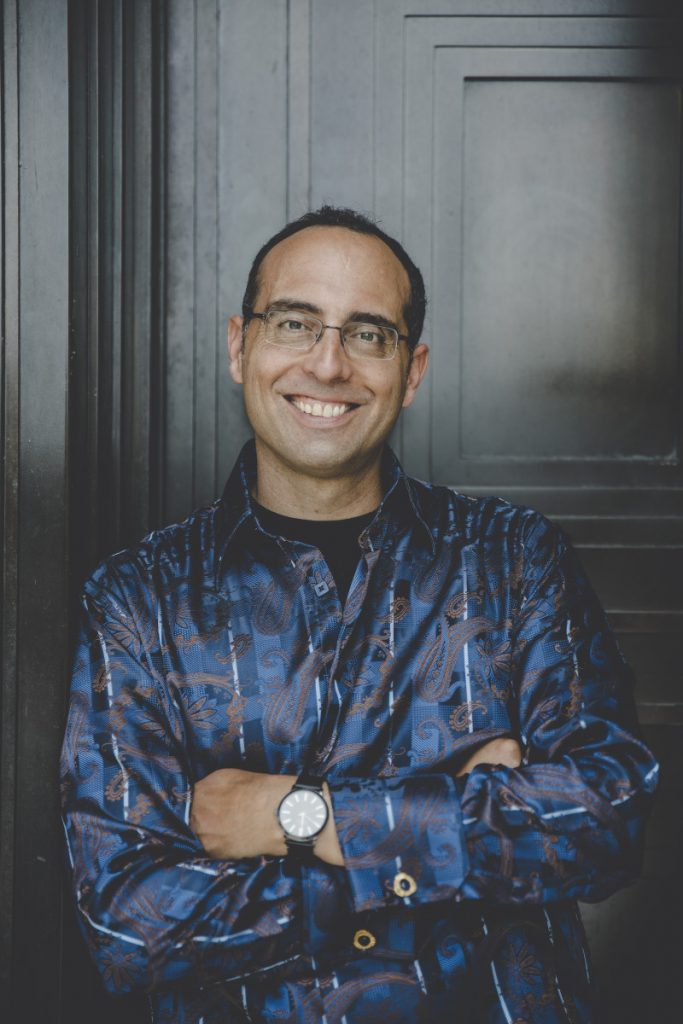
James Buckser
Staff writer
Philip Metres knows first hand that the stories we tell have power, having spent his career telling his own and translating others.
“One of the things that strikes me about literature is that it really does require our imagination in a way that a lot of our contemporary media does not — it offers us a kind of a text, but we put it together, we make sense of it, just as we do in our own lives,” Metres said. “Story is the way we organize our understanding of ourselves and the world.”
A poet, author and translator, Metres will bring his perspective on story and literature to Chautauqua at 2 p.m. today in the Hall of Philosophy, as a part of the Interfaith Lecture Series and its Week Six theme, “Literature and Meaning-Making.”
As someone who has been “profoundly impacted and blessed and changed” by the reading and writing of literature,” Metres said he was “grateful to have the opportunity to share a little bit about what I find so distinctive about it and why we need it more than ever.”
Metres will also be interrogating more nuanced issues of storytelling, and the ways in which “stories can be really problematic” and “dangerous in their own way.”
“They’re very powerful; they have a huge upside,” Metres said “They (also) often leave things out, and so every narrative can be both compelling and also powerful and also dangerous.”
In the modern American political landscape, the two main parties have dominant narratives about reality, Metres said, leading to a “post-facts moment.”
“Part of that is, I think, that people have decided that the story is more important than the facts,” Metres said.
This, Metres said, is because people feel good within these narratives, where the world makes sense.
“The kinds of stories we need to tell are ones that sometimes can be discomforting,” Metres said. “People don’t like to be discomforted; people don’t like to face complexity, unfortunately. We prefer things to be easy, so we (can go) about our daily lives.”
Metres’ newest book of translated poems, Ochre and Rust: New Poems of Sergey Gandlevsky, will be released in October of this year.
It highlights works from a poet Metres said he “really fell in love with” while living in Russia. Metres’ first book of translation was also of Gandlevsky’s poems.
“His work just absolutely devastated me and fascinated me,” Metres said. “He’s sort of a slow writer, but I kept translating his poems, even though they came out just a few a year, and I decided that I wanted to produce another one of his work.”
Ochre and Rust “spans 50 years of writing,” from Gandlevsky, who Metres said is now “in his 70th year of life” and living in exile in Tbilisi, Georgia, due to the war in Ukraine.
Metres will publish another book of his own work in 2024, Fugitive/Refuge, exploring the journey of his great-grandfather and grandfather from exile in Lebanon, and how the family came to the United States.
Metres said some of his inspiration for this book, about “the story and problem of human migration and the quest for home,” was seeing refugee crises in places like Syria, Afghanistan and Ukraine.
“I just found myself really moved and disturbed and horrified by just how many lives were being cratered and absolutely devastated by war,” Metres said. “I wanted to write a book that would be wrestling with this question about what was happening, what people were enduring and going through in the process of having to leave their homes and make a life elsewhere.”
Metres said he hopes Chautauquans will leave his talk continuing to “see literature as a source and a resource for their own self understanding and understanding of the world,” as well as a “repository of voices” that will “change us in the process of engaging with them.”
“It’s just so cool that a person anywhere could read a story from any other place and suddenly be connected to that other place,” Metres said, “to a way of seeing the world that might be totally different than their own, or might be so similar to their own that it opens up a different kind of door.”




